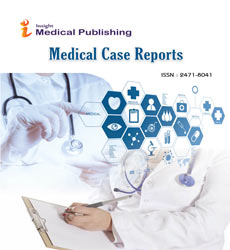Heart-Related Complications of Prolonged Seizures: Mechanisms and Management
Omar Tariq
Department of Medicine, Lebanese University, Beirut, Lebanon
Published Date: 2025-01-29DOI10.36648/2471-8041.10.6.410
Omar Tariq*
1Department of Medicine, Lebanese University, Beirut, Lebanon
- *Corresponding Author:
- Omar Tariq,
Department of Medicine, Lebanese University, Beirut, Lebanon
E-mail: omar@gmail.com
Received date: October 30, 2024, Manuscript No. IPMCRS-24-20179; Editor assigned date: November 01, 2024, PreQC No. IPMCRS-24-20179 (PQ); Reviewed date: November 15, 2024, QC No. IPMCRS-24-20179; Revised date: November 22, 2024, Manuscript No. IPMCRS-24-20179 (R); Published date: November 29, 2024, DOI: 10.36648/2471-8041.10.6.410
Citation: Tariq O (2024) Heart-related Complications of Prolonged Seizures: Mechanisms and Management. Med Case Rep Vol.10 No.6: 410.
Description
Seizures are neurological events characterized by abnormal electrical activity in the brain, which can vary in severity and duration. While most seizures are brief and may cause minimal systemic effects, prolonged seizures, especially those lasting more than five minutes, can lead to serious consequences. One of the often overlooked but significant manifestations of prolonged seizures is their impact on the cardiovascular system. Cardiac complications related to seizures are important to recognize, as they can have serious repercussions on patient outcomes.
During a seizure, particularly a prolonged one, the body undergoes a series of complex physiological changes that can affect multiple organ systems, including the heart. One of the primary mechanisms underlying the cardiac effects of seizures is autonomic nervous system dysfunction. The autonomic nervous system, which controls involuntary functions such as heart rate and blood pressure is often dysregulated during a seizure. This dysregulation can result in either sympathetic over activity or parasympathetic underactivity. The sudden activation of the sympathetic nervous system during a seizure leads to tachycardia, which can put a strain on the heart, increasing myocardial oxygen demand and potentially causing ischemia, especially if the heart is already compromised by pre-existing conditions.
Another significant factor in seizure-related cardiac effects is electrolyte imbalance. Prolonged seizures can cause dramatic shifts in the levels of key electrolytes like sodium, potassium, calcium and magnesium, all of which play critical roles in maintaining the heart's electrical conduction system. For instance, hypoxia or low oxygen levels, commonly seen during seizures, can lead to metabolic acidosis and disturbances in potassium levels, which can trigger arrhythmias. Furthermore, changes in calcium levels can directly affect the heart’s ability to contract, leading to potential arrhythmias or other disturbances in heart rhythm. These electrolyte imbalances may be compounded by changes in blood pH, which can further destabilize the cardiac rhythm and contribute to serious complications.
Postictal cardiac changes require monitoring
The postictal period, which occurs after the cessation of a seizure, is another time when cardiac manifestations can arise. During this recovery phase, patients may experience transient hypertension and tachycardia as the body tries to stabilize. These cardiovascular changes are typically short-lived but can have significant consequences, particularly in individuals with underlying cardiovascular disease. Moreover, the postictal state may sometimes trigger arrhythmias or worsen pre-existing conditions like heart failure or stroke, making close monitoring necessary in these patients.
The cardiac complications that can result from prolonged seizures vary widely in severity, ranging from relatively mild issues such as tachycardia to more serious complications such as arrhythmias and in rare cases, sudden cardiac death. Tachycardia or an abnormally fast heart rate, is one of the most commonly observed cardiac manifestations during or after a seizure. This is due to the heightened sympathetic tone that accompanies a seizure. While tachycardia itself may not always be life-threatening, it can lead to increased oxygen demand on the heart, especially if the patient has underlying coronary artery disease or other risk factors. Additionally, persistent tachycardia can cause further cardiac strain, potentially leading to complications such as myocardial infarction or heart failure.
Seizures may trigger dangerous arrhythmias
Arrhythmias are another common consequence of prolonged seizures. The most common arrhythmias associated with seizures include Premature Ventricular Contractions (PVCs), atrial fibrillation and ventricular tachycardia. These arrhythmias occur because of the disruptions in the electrical activity of the heart, which can be triggered by autonomic dysfunction, electrolyte imbalances and hypoxia. In some cases, these arrhythmias can be life-threatening, particularly if they lead to more severe arrhythmias like ventricular fibrillation, which can cause cardiac arrest if not promptly treated.
Bradycardia or a slow heart rate, is less commonly seen but can still occur in some cases of seizure. This is particularly true for focal seizures that affect regions of the brain responsible for regulating heart rate. Bradycardia can result from excessive parasympathetic activation, which may lead to symptoms like syncope or in severe cases, cardiac arrest. This makes bradycardia another important potential complication in the context of prolonged seizures, particularly in patients with preexisting heart conditions or those who are vulnerable to sudden changes in heart rate.
In rare instances, prolonged seizures have been associated with Sudden Cardiac Death (SCD). While the precise mechanisms remain unclear, it is believed that severe arrhythmias, possibly exacerbated by metabolic disturbances, may lead to fatal outcomes in individuals experiencing status epilepticus or prolonged seizure activity. Patients with underlying cardiovascular disease, such as arrhythmias or congenital heart conditions, are at higher risk for sudden death during or after a seizure.

Open Access Journals
- Aquaculture & Veterinary Science
- Chemistry & Chemical Sciences
- Clinical Sciences
- Engineering
- General Science
- Genetics & Molecular Biology
- Health Care & Nursing
- Immunology & Microbiology
- Materials Science
- Mathematics & Physics
- Medical Sciences
- Neurology & Psychiatry
- Oncology & Cancer Science
- Pharmaceutical Sciences
